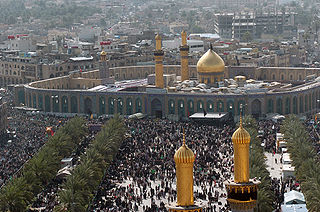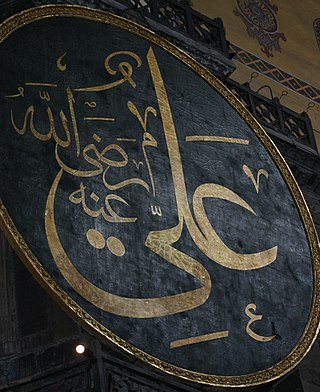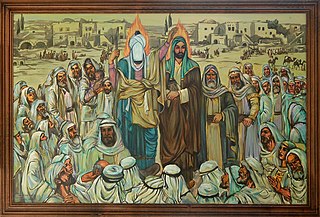Related Research Articles
Shia Islam is the second-largest branch of Islam. It holds that the Islamic prophet Muhammad designated Ali as his successor (khalifa) and the Imam after him, most notably at the event of Ghadir Khumm, but was prevented from succeeding Muhammad as the leader of the Muslims as a result of the choice made by some of Muhammad's other companions (sahaba) at Saqifah. This view primarily contrasts with that of Sunni Islam, whose adherents believe that Muhammad did not appoint a successor before his death and consider Abu Bakr, who was appointed caliph by a group of Muhammad's other companions at Saqifah, to be the first rightful (rashidun) caliph after Muhammad. Adherents of Shia Islam are called Shia Muslims.
Ja'far ibn Muhammad al-Sadiq was a Shia Muslim scholar, jurist, and theologian, and the sixth imam of the Twelver and Isma'ili branches of Shia Islam. Known by the title al-Sadiq, Ja'far was the founder of the Ja'fari school of Islamic jurisprudence. The hadith recorded from al-Sadiq and his predecessor, Muhammad al-Baqir, are said to be more numerous than all the hadith preserved from the Islamic prophet Muhammad and the other Shia imams combined. Among other theological contributions, he elaborated the doctrine of nass and isma, as well as that of taqiya.

In Shia Islam, Arba'in marks forty days after Ashura, which is the martyrdom anniversary of Husayn ibn Ali, grandson of the Islamic prophet Muhammad and the third Shia imam. Husayn was killed, alongside most of his relatives and his small retinue, in the Battle of Karbala on 10 Muharram 61 AH against the army of the Umayyad caliph Yazid ibn Mu'awiya. The battle followed Husayn's refusal to pledge his allegiance to Yazid, who is often portrayed by Muslim historians as impious and immoral. In Shia Islam, Karbala symbolizes the eternal struggle between good and evil, the pinnacle of self-sacrifice, and the ultimate sabotage of Muhammad's prophetic mission.

Hossein Mohyeddin Ghomshei is an Iranian scholar, philosopher, author, and lecturer on literature, art, and mysticism.
Ahl al-Bayt refers to the family of the Islamic prophet Muhammad. In Sunni Islam, the term has also been extended to all descendants of the Banu Hashim and even to all Muslims. In Shia Islam, the term is limited to Muhammad, his daughter Fatima, his cousin and son-in-law Ali, and their two sons, Ḥasan and Ḥusayn. A common Sunni view adds the wives of Muhammad to these five.

Ali ibn Abi Talib was the cousin and son-in-law of the Islamic prophet Muhammad. Ali contributed significantly to Islam in its early years and was likely the first male to accept the teachings of Muhammad. Ali is accorded an almost legendary place in Islam as a paragon of virtues, a fount of wisdom, and a fearless but magnanimous warrior. In Shia Islam Ali is regarded as the foremost companion of Muhammad and his rightful successor through divinely-ordained designation at the Ghadir Khumm.

The Ghadīr Khumm was a gathering of Muslims to attend a sermon delivered by the Islamic prophet Muhammad on 16 March 632 CE. The gathering is said to have taken place by the ghadir (pool) in the wadi of Khumm, located near the then settlement of al-Juhfa on the path between Mecca and Medina, where Muhammad halted the large caravan of Muslims who had accompanied him in the Farewell Pilgrimage, his only Hajj ritual.
The event of the mubahala was an aborted attempt to resolve a theological dispute between Muslims and Christians in c. 632 CE by invoking the curse of God upon the liars. These debates took place in Medina, located in the Arabian Peninsula, between a Christian delegation from Najran, a city in South Arabia, and the Islamic prophet Muhammad, who proposed this solution probably when their discourse had reached a deadlock concerning the nature of Jesus, human or divine.
Margaret Smith was a British orientalist specializing in comparative religion and Sufism.
Fatemeh Keshavarz Ph.D. is an Iranian academic, Rumi and Persian studies scholar, and a poet in Persian and English. She is the Roshan Chair of Persian Studies and Director of the Roshan Institute for Persian Studies at the University of Maryland, since 2012. Previously, she served as a professor of Persian Language and Comparative Literature for twenty years and chair of the department of Asian and Near Eastern Languages and Literatures at Washington University in St. Louis from 2004 to 2011.

Grand AyatollahJafar Sobhani is an Iranian Twelver Shia marja, influential theologian and writer. Sobhani was a former member of the Society of Seminary Teachers of Qom and founder of Imam Sadiq Institute in Qom.
Ahl al-Kisa, also known as the Al al-Aba, are Muhammad the Islamic prophet, his daughter Fatima, his cousin and son-in-law Ali, and his two grandsons Hasan and Husayn.
Reza Shah-Kazemi is an author who specializes in comparative mysticism, Islamic Studies, Sufism and Shi'ism. He is the founding editor of the Islamic World Report and currently a research associate at the Institute of Ismaili Studies with the Department of Academic Research and Publications. He received degrees in International Relations and Politics at Sussex and Exeter University, before receiving his doctorate in Comparative Religion from the University of Kent in 1994. He later acted as a consultant to the Institute for Policy Research in Kuala Lumpur.
Syed Mohammad Waris Hasan Naqvi was a Shia muslim cleric from Lucknow, Uttar Pradesh, India.

Marital life of Fatima portrays the marriage of Fatima, daughter of the Islamic prophet Muhammad, and Muhammad's cousin, Ali. Fatima and Ali were both significant figures in early Islam: Fatima has been compared to Mary, the mother of Jesus, especially in Shia Islam. Muhammad is said to have regarded her as the best of women and the dearest person to him. Ali was the fourth of the Rashidun Caliphs and the first Shia Imam. Muhammad is widely reported to have likened Ali's position in Islam to that of Aaron in Judaism.
The University of Religions and Denominations is a teaching and research center in Qom, Iran. It focuses on the study of religions and Islamic sects.
Anthony Oliver Davies is a British systematic theologian. He has made contributions to the study of medieval mysticism, early medieval Welsh and Irish spirituality, and contemporary Systematic Theology. He presently works in the fields of neuroscience, theology and social transformation. Davies is the originator together with Paul Janz and Clemens Sedmak of ‘Transformation Theology’. Since 2004 he has held the chair of Christian Doctrine at King's College London, as a Roman Catholic layman. He is founding director of the Centre for Social Transformation at King's College London, which specializes in the development of 'global' or 'ecumenical' understandings of the self in the light of comparative philosophy, traditional philosophies and new advances in the neurology of social cognition.

Tasu'a is the ninth day of Muharram, the first month of the Islamic calendar. Tasu'a is followed by Ashura, tenth of Muharram, which marks the death of Husayn ibn Ali, a grandson of the Islamic prophet Muhammad and the third Shia imam. Husayn refused on moral grounds to pledge his allegiance to the Umayyad caliph Yazid I and was subsequently killed, alongside most of his male relatives and his small retinue, by the Umayyad army in the Battle of Karbala on Ashura 61 AH. Among the Shia minority, mourning for Husayn is viewed as an act of protest against oppression, a struggle for God, and a means of securing the intercession of Husayn in the afterlife. Ashura is observed through mourning gatherings, processions, and dramatic reenactments. In such ceremonies, Shia mourners strike their chests to share in the pain of Husayn. Extreme self-flagellation, often involving self-inflicted bloodshed, remains controversial among the Shia, condemned by many Shia clerics, and outlawed in some Shia communities.
Shia Islam in Senegal is practiced small number of Senegalese people, as well as by the Lebanese community in Senegal.
Rebecca Ruth Gould is a writer, translator, and Distinguished Professor, Comparative Poetics & Global Politics at SOAS University of London. Her interests range across the Caucasus, Comparative Literature, Islam, Islamic Law, Islamic Studies, Persian literature, poetry, and poetics. Her PhD dissertation focused on Persian prison poetry, and was published in revised form as The Persian Prison Poem: Sovereignty and the Political Imagination (2021). Her articles and translations have received awards from English PEN, the International Society for Intellectual History’s Charles Schmitt Prize, the Modern Language Association’s Florence Howe Award for Feminist Scholarship, and the British Association for American Studies’ Arthur Miller Centre Essay Prize. Gould's work also deals with legal theory and the theory of racism, and she is a critic of the International Holocaust Remembrance Alliance's Working Definition of Antisemitism.
References
- ↑ "After the London bombings". BBC. 5 September 2005. Retrieved 4 January 2013.
- ↑ "My family were Christian in name, but not really Christian in belief". Imam Hussain.com-International Media. 30 April 2012. Retrieved 4 January 2012.
- 1 2 3 4 "Rebecca Masterton". Centre for Shia and Cultural Studies. Retrieved 28 May 2022.
- 1 2 Lecturer, Islamic College for Advanced Studies, London-Sessen II, page, 9 (PDF). Islamic Thought.com.UK. Retrieved 4 January 2013.
- ↑ english. "Rebecca Masterton – The Enlightened to Shia Islam Centre" . Retrieved 24 June 2020.
- ↑ "Dr. Rebecca Masterton". The Islamic College.
- ↑ "Book Review". Oxford Journal.Org_Journal of Islamic Studies. Archived from the original on 15 April 2013. Retrieved 4 January 2013.